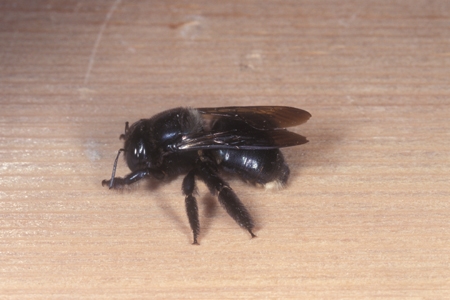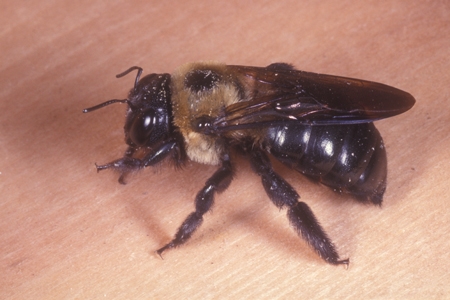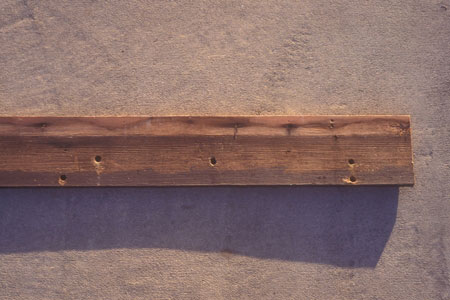Active Seasons




Carpenter Bee Appearance and Size Facts
Carpenter bees, often confused with bumblebees, have distinctive behaviors and appearances that set them apart. Unlike bumblebees, carpenter bees have shiny abdomens and lack the characteristic fuzzy look of other bees. These solitary bees prefer wood for nesting, so keep an eye out for them hovering around eaves, decks, or wooden structures and drilling perfectly round entry holes into the wood.
Finding carpenter bees in southern Florida can be more than just a nuisance. They can jeopardize the integrity of your home. With over 50 years of expertise in pest control, Hulett Environmental Services excels in identifying, preventing, and treating carpenter bee infestations in the sunny locales of southern Florida. Trust Hulett to guide you through the process of protecting your home and family from carpenter bees and bringing back the pest-free living environment you’ve missed.
Distinguishing Carpenter Bees From Other Bees
While carpenter bees may look similar to other insects, they leave distinct signs. Look for perfectly round holes, about the diameter of a dime, on wooden surfaces, serving as entry points to their galleries within the wood. The accumulation of coarse sawdust beneath these holes, known as frass, is another unmistakable sign. Additionally, be attentive to their presence, especially during the spring when they’re most active. They love to hide under wooden decks and inside railings, so take extra care to check these spots for bees.
We provide bee removal for carpenter bees in the following locations and their surrounding areas:

Behavior and Habitat of Carpenter Bees
Carpenter bees are solitary bees that build nests in structural wood, bamboo, and dead trees. Galleries are made by the female, who chews into the wood, hollowing out a chamber. The female then deposits a mass of pollen and nectar in the chamber and lays an egg there. She then plugs the chamber with chewed wood pulp and excavates until she has laid six to eight eggs. Nest galleries are reused for generations.

Signs of Infestation of Carpenter Bees
Watch for round, smooth holes on wooden surfaces, typically about the diameter of a dime. These perfectly drilled entry points serve as evidence of carpenter bee activity. Additionally, observe the ground beneath these holes for the accumulation of sawdust and wood shavings. If you notice these signs around your property, you likely have a carpenter bee infestation that requires attention.

Tips for Prevention of Carpenter Bees
Take proactive steps to help keep carpenter bees out of your home. Begin by sealing and painting exposed wood surfaces, as untreated wood attracts carpenter bees. Consider using hardwood or pressure-treated wood for vulnerable areas, as these are more resistant to damage caused by bees. Disturbing carpenter bees without proper equipment can pose a significant health risk, so it’s crucial to contact Hulett Environmental Services if you suspect an infestation. Our professionals will conduct a thorough inspection and create a tailored treatment plan to remove the bees from your property with lasting results.
Getting Rid of Carpenter Bees
Attempting to handle an infestation without the proper equipment can pose health risks, given the bees’ potential for aggression if provoked. Contact Hulett Environmental Services for a comprehensive inspection and tailored treatment plan to help protect your home from the structural damage caused by these industrious builders.
Effective Carpenter Bee Control Solutions
Carpenter bees may be diligent builders, but their activities can wreak havoc on your home. With Hulett Environmental Services, you have a reliable partner in managing and eliminating carpenter bee infestations in southern Florida. Trust us to provide effective solutions that help prevent these buzzing pests from causing structural damage.
Don’t let carpenter bees compromise your home’s structural integrity. With our prompt inspection services, we can create a treatment plan on the same day, ensuring your home remains a carpenter bee-free zone. Just call Hulett, and we’ll take care of the rest!



